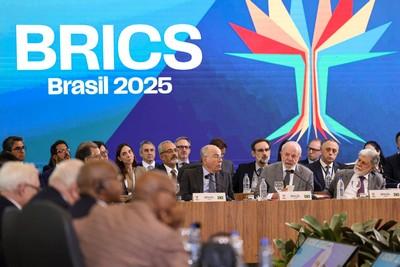
‘Greater BRICS’ a platform to foster constructive consensus
Evandro Menezes de Carvalho
The first few months of the Trump administration have shaken up the chessboard of the international system. Some pieces on this board, which were accustomed to playing in certain positions, are being discarded or forced to assume new roles. Using chess as a metaphor, those who were once “queens” are now being treated as “pawns,” while those who were seen as “rooks” are beginning to be perceived as “kings.” The dispute becomes even more challenging when those who believe they own the board frequently change the rules that everyone is accustomed to.
For a long time, it was believed that countries with similar regimes and shared political conceptions were naturally inclined toward solidarity, leading to the conciliation of interests when conflicts arose between them. On the other hand, in heterogeneous state systems, the consequences would be the opposite, as countries would uphold values that are considered contradictory. In such heterogeneous systems, conflict would be the rule rather than the exception. However, BRICS challenges this world conception.
Many believed that BRICS’ heterogeneity was its weakness. However, over time, BRICS has demonstrated that it is possible to establish a well-intentioned dialogue platform among different countries, leading to concrete initiatives capable of benefiting all populations involved. The most illustrative example of this ability to foster constructive consensus – not just rhetorical consensus – is the New Development Bank.
The recent expansions of BRICS demonstrate its vitality and credibility on the international relations chessboard. On January 1, 2024, Egypt, Ethiopia, Iran and the United Arab Emirates joined BRICS. In January of this year, Brazil announced the official admission of Indonesia as a full member. The “Greater BRICS” proves the success of this heterogeneous platform of countries united around common objectives, particularly the reform of global governance institutions and the deepening of South-South cooperation.
The “Greater BRICS” comprises 46 percent of the world’s population and has a global GDP in purchasing power parity (PPP) close to 40 percent, exceeding the global GDP in PPP of the G7 countries, which is approximately 30 percent. On January 1, 2025, Belarus, Bolivia, Kazakhstan, Cuba, Malaysia, Thailand, Uganda, Uzbekistan and Nigeria joined BRICS as “partner countries.” This modality of membership was created during the Kazan Summit in October 2024. These nine nations can endorse the BRICS Summit Declaration, the BRICS Foreign Ministers’ Joint Declaration and other official documents. The legitimacy of the “Greater BRICS” is further reinforced by more than 30 countries’ interest in joining the group.
The “Greater BRICS” has demonstrated its strong appeal to developing countries. Its most significant asset lies in its respect for the principle of sovereign equality and its advocacy for a more democratic international system. The focus is not on imposing rules or values but on promoting a more inclusive international order by respecting and valuing the differences of each country, including cultural. The “Greater BRICS” is the materialization of the dream of a fairer, more peaceful international system. We must nourish this dream even while acknowledging the difficulties of the real world. Brazil’s Minister of Foreign Affairs, Mauro Vieira, said, “BRICS represents a new vision of global governance – one that prioritizes inclusion, equity and cooperation over hegemony, injustice, inequality and unilateralism.”
The theme of the next summit, to be held in Brazil, highlights the strengthening of Global South cooperation for more inclusive and sustainable governance. The agenda proposed by the Brazilian presidency includes facilitating trade and investment among BRICS countries, including payment methods and discussions on the impacts of AI and climate change on the labor market. Global health cooperation and the institutional development of BRICS are also on the agenda and deserve our attention. Because it is more representative of humanity as a whole and driven by the spirit of cooperation that unites Global South countries, the results of the 17th BRICS Summit could have more positive impacts on humanity than the G20 has been able to offer.
The writer is a professor of international law at the Federal Fluminense University in Rio de Janeiro, and Wutong chair professor at the Beijing Language and Culture University
